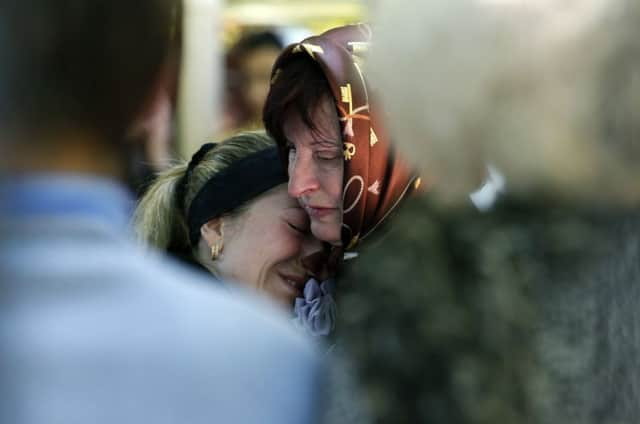Ukraine: Mixed messages as US disputes Putin claims


Mr Putin also urged pro-Russian insurgents in south-east Ukraine to postpone a referendum on autonomy set for Sunday.
However, the US military said it had seen no sign of a Russian troop withdrawal.
Advertisement
Hide AdAdvertisement
Hide Ad“We’ve seen no change in the Russian force posture along the Ukrainian border,” said a Pentagon spokesman, US Army Colonel Steve Warren, insisting America “would know” if Russian troops were on the move.
In a Moscow meeting with Swiss president Didier Burkhalter, Mr Putin said Russian troops have been recalled to their training grounds and locations for “regular exercises,” but didn’t specify whether those locations were in areas near Ukraine.
A defence ministry spokesman declined to say where Russia’s troops were now positioned.
Mr Putin also called on Ukraine’s military to halt operations against pro-Russia activists who have seized government buildings and police stations in at least a dozen towns in eastern Ukraine.
Ukraine government forces launched an offensive late last week to take back buildings and towns under pro-Russian control. At least 35 people, many pro-Russians, died in that offensive, the Kiev government said.
Many had feared that Sunday’s vote on more autonomy would be a flashpoint for further violence between the rebels and Ukrainian troops in the east. Russia annexed the Ukrainian Black Sea peninsula of Crimea in March after a vote which overwhelmingly endorsed secession.
“We believe that the most important thing is to create direct, full-fledged dialogue between the Kiev authorities and representatives of south-east Ukraine,” Mr Putin said.
“Because of this, we ask that representatives of south-east Ukraine, supporters of federalisation in the country, postpone the 11 May referendum in order to create the necessary conditions for such a dialogue,” he added.
Advertisement
Hide AdAdvertisement
Hide AdDespite his comments, pro-Russia militants calling themselves the Donetsk People’s Republic said they would still hold the referendum on Sunday.
Mr Putin also called Ukraine’s 25 May presidential election a move “in the right direction,” and said his talk with Mr Burkhalter, chairman-in-office for the Organisation for Security and Co-operation in Europe, encouraged him that “our approaches [to Ukraine] coincide”.
The Russian leader repeated that constitutional reforms must precede any nationwide vote in Ukraine.
In Berlin, a leading Ukrainian presidential candidate said he was prepared to negotiate a decentralisation of power as pro-Russia insurgents in the east have demanded. But Petro Poroshenko, a billionaire chocolate magnate, added that some insurgents in the east understand only “the language of force”.
The US and European nations have increased diplomatic efforts ahead of the presidential election as the insurgency makes eastern Ukraine increasingly unsafe for journalists and international observers.
Seven international military observers with an OSCE mission were taken hostage by pro- Russian insurgents in the eastern city of Slovyansk on 25 April and released last Saturday.
Russia and the West have expressed a desire for the OSCE to play a greater role in defusing tensions in Ukraine.
In Kiev, the Ukrainian capital, Jeffrey Feltman, the United Nations under-secretary-general for political affairs, met with Ukraine’s acting president Oleksandr Turchynov yesterday after visiting Moscow a day earlier. Foreign Secretary William Hague also arrived for talks.
Advertisement
Hide AdAdvertisement
Hide AdIn an interview, Mr Hague backed the planned presidential election.
Ukrainians “cannot be bullied out of having their elections by disorder that is deliberately fomented and co-ordinated from another country, in this instance Russia,” he said.
In one sign of compromise from the authorities in Kiev, Pavel Gubarev, the self- proclaimed “people’s mayor” detained in March, was set freed yesterday and was seen back in Slovyansk.
His release was a major rallying cry for the pro-Russian side.